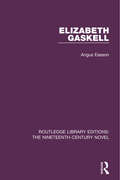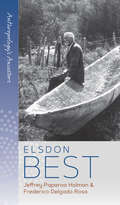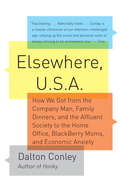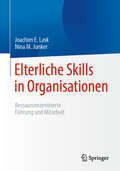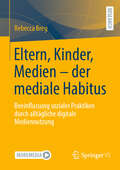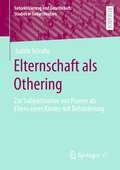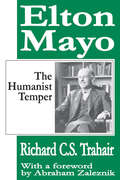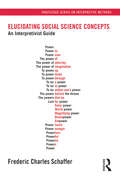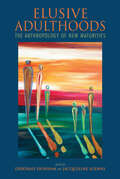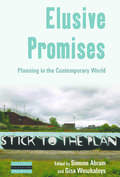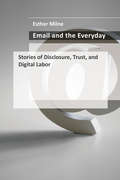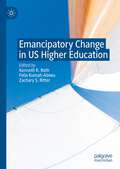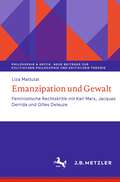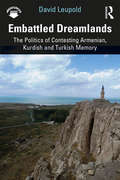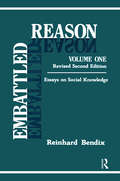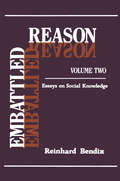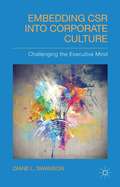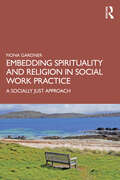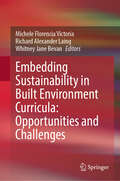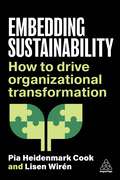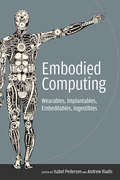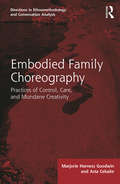- Table View
- List View
Elizabeth Gaskell: Electronic Edition (Routledge Library Editions: The Nineteenth-Century Novel #11)
by Angus EassonFirst published in 1979, this book looks at every aspect of the life and work of Elizabeth Gaskell, including her lesser known novels and writings — especially those concerning life in the industrial north of Victorian England. It shows how her work springs from a culture and society which pervades all she thought and wrote. An opening chapter explores her religion, culture, friendships and family. The major works are considered in turn and background material relevant to the novels’ industrial scenes is presented. The process of literary creation is charted in material drawn from letters and by examination of the manuscripts. Her short stories, journalism and letters are also considered.
Elon Musk (edición en español)
by Walter IsaacsonDel autor de Steve Jobs y otras grandes biografías, todas ellas éxitos internacionales de ventas, esta es la historia asombrosamente íntima del innovador más fascinante y polémico del mundo, un visionario que ha roto todos los moldes y ha conducido al mundo a la era de los vehículos eléctricos, la exploración espacial privada y la inteligencia artificial. Ah, y el mismo que compró Twitter.Cuando Elon Musk era un niño en Sudáfrica, sufría a menudo acoso escolar. Un día un grupo de niños lo empujó por unas escaleras de hormigón y le patearon hasta que su cara se hinchó como una pelota. Pasó una semana en el hospital. Pero las cicatrices físicas fueron insignificantes comparadas con las emocionales, las que le había causado su padre, un canalla, ingeniero carismático y fantasioso. Cuando Elon llegó a casa tras ser dado de alta del hospital, su padre le reprendió. «Tuve que escucharlo durante una hora mientras me gritaba, me llamaba idiota y me decía que era un inútil», recuerda. El impacto psicológico que su padre le causó perduró. Se convirtió en un joven fuerte pero vulnerable al mismo tiempo, propenso a bruscos cambios de humor -a lo Jekyll y Hyde-, con una gran tolerancia al riesgo, ansias de drama, un épico sentido de misión y una intensidad maníaca, cruel y a veces destructiva.A principios de 2022, después de un año marcado por el lanzamiento de treinta y un satélites de SpaceX, la venta de un millón de coches de Tesla y de convertirse en el hombre más rico de la tierra, Musk confesó con arrepentimiento su impulso por provocar el drama. «Necesito cambiar mi forma de pensar para que deje de estar en modo crisis, como lo he estado en los últimos catorce años, o probablemente toda mi vida», explicó.Fue un comentario melancólico, no un propósito de año nuevo. Cuando hizo la promesa, estaba comprando en secreto acciones de Twitter, el patio de recreo por excelencia. Con los años, cuando se encontraba en un momento difícil, se veía transportado de nuevo al acoso que sufrió en el patio del colegio. Ahora tenía la oportunidad de poseerlo. Durante dos años, Isaacson fue la sombra de Musk, asistió a sus reuniones, recorrió juntos sus fábricas, y pasó horas entrevistándolo a él, a su familia, amigos, compañeros y adversarios. El resultado es un relato íntimo y revelador, repleto de historias asombrosas, triunfos y perturbaciones, que aborda la pregunta: ¿son los demonios que mueven a Musk también lo que se necesita para impulsar la innovación y el progreso?
Elsdon Best (Anthropology's Ancestors)
by Jeffrey Paparoa Holman Frederico Delgado RosaNew Zealander ethnographer, Elsdon Best is a key figure in the history of anthropology due to his involuntary triggering of a fundamental and long-lasting anthropological debate on the Māori concept of hau. This volume is dedicated to this important scholar, who at the same time was shadowed by metropolitan anthropology and became an excluded ancestor, along with his Māori interlocutors and ethnographic collaborators. By recentering his place as one of anthropology’s ancestors, the volume contributes to a new perception of the discipline’s past.
Elsewhere, U.S.A.
by Dalton ConleyOver the past three decades, our daily lives have changed slowly but dramatically. Boundaries between leisure and work, public space and private space, and home and office have blurred and become permeable. InElsewhere, U. S. A. , acclaimed sociologist Dalton Conley connects our day-to-day experiences with occasionally overlooked sociological changes, from women's increasing participation in the labor force to rising economic inequality among successful professionals. In doing so, he provides us with an X-ray view of our new social reality.
Elterliche Skills in Organisationen: Ressourcenzentrierte Führung und Mitarbeit
by Joachim E. Lask Nina M. JunkerElterliche Skills in Organisationen - Ressourcenzentrierte Führung und Mitarbeit Basierend auf aktuellen wissenschaftlichen Erkenntnissen verdeutlicht „Elterliche Skills in Organisationen“, wie sich Organisationen und jeder Einzelne die aus der Elternrolle erworbenen Kompetenzen ressourcenorientiert nutzbar machen können. Denn es ist nachgewiesen, dass zahlreiche Ähnlichkeiten zwischen der Elternrolle und der Rolle als Mitarbeitende und Führungskräfte bestehen. Dadurch kann beachtlicher gegenseitiger Kompetenzerwerb ermöglicht werden. Wie dies möglich ist, welche Skills für Führungskräfte besonders relevant sind und wie der positive Transfer der Kompetenzen aus der Elternrolle unterstützt und für die Tätigkeit im Unternehmen noch besser eingesetzt werden kann, erfahren Sie in diesem Buch. Zielgruppen: Führungskräfte, HRM-Fachleute, Coaches, TrainerInnen, PsychologInnen, WirtschaftswissenschaftlerInnen, sowie Eltern. Zu den Autoren: Dipl.-Psych. Joachim E. Lask, Wirtschafts- und Familien-Psychologe und Leiter des WorkFamily-Instituts, berät Organisationen und forscht zum Work-Family Enrichment. Dr. Nina M. Junker, Associate Professor an der University of Oslo, ist Arbeits- und Organisationspsychologin. Sie forscht und publiziert unter Berücksichtigung sozialpsychologischer Konzepte seit vielen Jahren zur Schnittstelle von Beruf und Privatleben.
Eltern, Kinder, Medien - der mediale Habitus: Beeinflussung sozialer Praktiken durch alltägliche digitale Mediennutzung
by Rebecca BregIn diesem Buch wird das Mediennutzungsverhalten von Heranwachsenden (11–15 Jahre) im Zusammenhang mit sozialer Herkunft und habituellen Mustern empirisch untersucht. Mithilfe von Fragebögen und Interviews wird die digitale Mediennutzung von Schüler*innen an Mittelschulen und Gymnasien verglichen. Die Ergebnisse zeigen, dass mediale Praktiken durch familiäre Strukturen, das soziale Umfeld und kulturelles Kapital beeinflusst werden. Die Untersuchung hebt Unterschiede im digitalen Nutzungsverhalten hervor, die sich in Zugangsmöglichkeiten, elterlicher Begleitung und der Mediennutzung im Alltag zeigen. Während Schüler*innen aus privilegierten Verhältnissen digitale Medien gezielt für Schule und Freizeit nutzen, steht bei sozioökonomisch schwächeren Heranwachsenden oft die Unterhaltung im Vordergrund. Das Konzept des Habitus zeigt, wie soziale Praktiken die Mediennutzung prägen. Digitale Medien sind eng mit sozioökonomischen Strukturen verknüpft. Das Buch liefert wertvolle Erkenntnisse für Eltern, Pädagog*innen und politische Entscheidungsträger*innen, um digitale Kompetenz und Chancengleichheit nachhaltig zu fördern.
Elternschaft als Othering: Zur Subjektivation von Paaren als Eltern eines Kindes mit Behinderung (Subjektivierung und Gesellschaft/Studies in Subjectivation)
by Judith TröndleDie Studie widmet sich der Erforschung doppelerwerbstätiger Paare, deren Kind als ‚behindert‘ markiert wurde. Paararrangements werden in ihrer paargeschichtlichen und interaktiven Dynamik rekonstruiert, wobei deutlich wird, gegenüber welchen Widerständen ein solches Modell der doppelten Erwerbstätigkeit behauptet werden muss. Gesellschaftliche Barrieren wirken entlang der Differenzlinien Behinderung und Geschlecht intersektional. Sie werden jedoch unsichtbar durch die Verlagerung in den privaten Raum, innerhalb dessen sie durch partnerschaftliche Arbeitsteilung beantwortet werden. Es steht dabei weniger die vermeintlich ‚besondere’ Gruppe im Fokus der Analyse, als Prozesse der Besonderung, Adressierung und Subjektivation als ‚andere Eltern’. Die Subjektivation eines Paares als ‚Eltern eines Kindes mit Behinderung’ beschränkt zugleich Chancen der (An-)Erkennbarkeit als Paar sowie als Individuum. Sie trägt zudem zur Reproduktion vergeschlechtlichter Sorgearrangements bei und verdeutlicht gesellschaftliche Prozesse der Grenzziehung und Bedingungen von (An-)Erkennbarkeit.
Elton Mayo: The Humanist Temper
by Abraham Zaleznik Richard C. TrahairThe definitive biography of the life and work of Elton Mayo (1880-1949) is the first full, accurate account of the activities and intimate life of one of Australia and America's pioneering social scientists. Mayo, who established the scientifi c study of organizational behavior, was highly infl uential in American social science and business management theory, following his work at the Harvard Business School and the Western Electric Company.
Elucidating Social Science Concepts: An Interpretivist Guide (Routledge Series on Interpretive Methods)
by Frederic Charles SchafferConcepts have always been foundational to the social science enterprise. This book is a guide to working with them. Against the positivist project of concept "reconstruction"—the formulation of a technical, purportedly neutral vocabulary for measuring, comparing, and generalizing—Schaffer adopts an interpretivist approach that he calls "elucidation." Elucidation includes both a reflexive examination of social science technical language and an investigation into the language of daily life. It is intended to produce a clear view of both types of language, the relationship between them, and the practices of life and power that they evoke and sustain. After an initial chapter explaining what elucidation is and how it differs from reconstruction, the book lays out practical elucidative strategies—grounding, locating, and exposing—that help situate concepts in particular language games, times and tongues, and structures of power. It also explores the uses to which elucidation can be put and the moral dilemmas that attend such uses. By illustrating his arguments with lively analyses of such concepts as "person," "family," and "democracy," Schaffer shows rather than tells, making the book both highly readable and an essential guide for social science research.
Elusive Adulthoods: The Anthropology of New Maturities
by Deborah Durham and Jacqueline SolwayEssays on the changing meanings of adulthood in places around the world: “An important collection that furthers anthropological work on life stages.” —Susan Reynolds Whyte, author of Generations in Africa: Connections and ConflictsElusive Adulthoods examines why, in recent years, complaints about an inability to achieve adulthood have been heard in societies around the world.By exploring the changing meaning of adulthood in Botswana, China, Sudan, Papua New Guinea, Russia, Sri Lanka, Uganda, and the United States, contributors to this volume pose the problem of “What is adulthood?” and examine how the field of anthropology has come to overlook this meaningful stage in its studies.Through these case studies we discover different means of recognizing the achievement of adulthood, such as through negotiated relationships with others, including grown children, and as a form of upward class mobility. We also encounter the difficulties that come from a sense of having missed full adulthood, instead jumping directly into old age in the course of rapid social change, or a reluctance to embrace the stability of adulthood and necessary subordination to job and family. In all cases, the contributors demonstrate how changing political and economic factors form the background for generational experience and understanding of adulthood, which is a major focus of concern for people around the globe as they negotiate changing ways of living.
Elusive Promises
by Simone Abram Gisa WeszkalnysPlanning in contemporary democratic states is often understood as a range of activities, from housing to urban design, regional development to economic planning. This volume sees planning differently-as the negotiation of possibilities that time offers space. It explores what kind of promise planning offers, how such a promise is made, and what happens to it through time. The authors, all leading anthropologists, examine the time and space, creativity and agency, authority and responsibility, and conflicting desires that plans attempt to control. They show how the many people involved with planning deal with the discrepancies between what is promised and what is done. The comparative essays offer insight into the expected and unexpected outcomes of planning (from visionary utopias to bureaucratic dystopia or something in-between), how the future is envisioned at the outset, and what actual work is done and how it affects people's lives.
Email and the Everyday: Stories of Disclosure, Trust, and Digital Labor
by Esther MilneAn exploration of how email is experienced, understood, and materially structured as a practice spanning our everyday domestic and work lives.Despite its many obituaries, email is not dead. As a global mode of business and personal communication, email outstrips newer technologies of online interaction; it is deeply embedded in our everyday lives. And yet--perhaps because the ubiquity of email has obscured its study--this is the first scholarly book devoted to email as a key historical, social, and commercial site of digital communication in our everyday lives. In Email and the Everyday, Esther Milne examines how email is experienced, understood, and materially structured as a practice spanning the domestic and institutional spaces of daily life.
Emancipatory Change in US Higher Education
by Zachary S. Ritter Kenneth R. Roth Felix Kumah-AbiwuThis edited volume explores and deconstructs the possibilities of higher education beyond its initial purpose. The book contextualizes and argues for a more robust interrogation of persistent patterns of campus inequality driven by rapid demographic change, reduced public spending in higher education, and an increasingly polarized political landscape. It offers contemporary views and critiques ideas and practices such as micro-aggressions, implicit and explicit bias, and their consequences in reifying racial and gender-based inequalities on members of nondominant groups. The book also highlights coping mechanisms and resistance strategies that have enabled members of nondominant groups to contest primarily racial- and gender- based inequity. In doing so, it identifies new ways higher education can do what it professes to do better, in all ways, from providing real benefit to students and communities, while also setting a bar for society to more effectively realize its stated purpose and creed.
Emanzipation und Gewalt: Feministische Rechtskritik mit Karl Marx, Jacques Derrida und Gilles Deleuze (Philosophie & Kritik. Neue Beiträge zur politischen Philosophie und Kritischen Theorie)
by Liza MattutatSoziale Bewegungen stehen seit jeher in einem ambivalenten Verhältnis zum Recht. Einerseits versuchen sie oft, ihre Ansprüche als Rechte geltend zu machen, andererseits kritisieren sie die entpolitisierenden, gewaltsamen und repressiven Aspekte des Rechts. Liza Mattutat fragt deshalb, ob Rechtspolitiken möglich sind, die nicht nur die Inhalte des Rechts, sondern zugleich seine Form verändern. Dazu rekonstruiert sie die rechtskritischen Argumente von Karl Marx, Jacques Derrida und Gilles Deleuze und deutet mit ihnen zeitgenössische Auseinandersetzungen um die Ehe für alle, die Reform des Sexualstrafrechts und die Elternschaft von trans* Personen. Wo sind philosophische Rechtskritiken für die feministische Rechtspolitik einschlägig? Wo steht das bürgerliche Recht emanzipatorischen Bewegungen entgegen?
Embarrassment of Product Choices 2: Towards a Society of Well-being
by Michel MillotProduct information is excessively commercial and technical. There is no single best product for all, and the price/quality ratio can be deceptive. Word of mouth is growing with opinions shared on the internet. This book calls for the reinvention of a new economy based on real requirements, not only for profit or “technology” but for qualities of use and the environment. A product’s use is its purpose. An innovation must always be an improvement to qualities of use. The emergence of new technologies, such as connected objects and the autonomous car, form a new trap for innovation, and progress has been limited to the perfection of technique. Marketing must no longer confuse the consumer (the customer) and the user. Complete with methodology for the reader to follow, this book describes how the ecology of use can become the main wealth of an economy based on quality of life and well-being.
Embattled Dreamlands: The Politics of Contesting Armenian, Kurdish and Turkish Memory
by David LeupoldEmbattled Dreamlands explores the complex relationship between competing national myths, imagined boundaries and local memories in the threefold-contested geography referred to as Eastern Turkey, Western Armenia or Northern Kurdistan. Spatially rooted in the shatter zone of the post-Ottoman and post-Soviet space, it sheds light on the multi-layered memory landscape of the Lake Van region in Southeastern Turkey, where collective violence stretches back from the Armenian Genocide to the Kurdish conflict of today. Based on his fieldwork in Turkey and Armenia, the author examines how states work to construct and monopolize collective memory by narrating, silencing, mapping and performing the past, and how these narratives might help to contribute and resolve present-day conflicts. By looking at how national discourses are constructed and asking hard questions about why nations are imagined as exclusive and hostile to others, Embattled Dreamlands provides a unique insight into the development of national identity which will provide a great resource to students and researchers in sociology and history alike.
Embattled Reason: Volume 1, Essays on Social Knowledge
by Reinhard BendixEmbattled Reason constitutes an intellectual profile of one of America's preeminent sociologists. This collection of essays, published over the course of thirty years, embodies a series of intellectual choices in response to current concerns and to debates of the past, affording a coherent and unified view of Bendix's work as a whole.
Embattled Reason: Volume 2, Essays on Social Knowledge
by Reinhard BendixEmbattled Reason constitutes an intellectual profile of one of America's preeminent sociologists. This collection of essays, published over the course of thirty years, embodies a series of intellectual choices in response to current concerns and to debates of the past, affording a coherent and unified view of Bendix's work as a whole. The articles are grouped under three headings. In "Conditions of Knowledge" the author is concerned with the value assumptions basic to the social sciences. Under "Theoretical Perspectives" the author presents the guiding considerations of his own work in a continuing dialogue with such thinkers as Tocqueville, Marx, Durkheim, and Weber. In the last section, "Studies of Modernization," Bendix takes up problems involved in an analysis of social change though a reexamination of evolutionist assumptions.
Embedding CSR into Corporate Culture
by Diane L. SwansonEmbedding CSR into Corporate Culture demonstrates that a new frontier for corporate social responsibility is possible in theory and practice. The key idea - discovery leadership - enables corporate managers to deal effectively with problems, issues, and value clashes occurring at the corporation-society interface.
Embedding Spirituality and Religion in Social Work Practice: A Socially Just Approach
by Fiona GardnerBlending material from social work with religious and spiritual sources, this book makes explicit that engaging with spirituality in its broadest sense is an essential aspect of socially just social work practice. Gardner connects shared understandings of spiritual/religious traditions, critically reflective social work, First Nations relational world views, green and relational approaches. Through multiple unique case studies, Embedding Spirituality and Religion in Social Work Practice: A Socially Just Approach outlines the theoretical framework of critical spirituality, which is explored as a way of workers’ understanding their own and others’ sense of meaning, whether it is spiritual and/or religious, and to encourage workers to be mindful, open, humble and energised as workers. Combining the theoretical and practical, this book outlines strategies and processes to ensure social workers embed spirituality in their practice constructively and inclusively across all areas of practice. This book will be of interest to those engaged in the wider field of social work, from direct service to policy development.
Embedding Sustainability in Built Environment Curricula: Opportunities and Challenges
by Michele Florencia Victoria Richard Alexander Laing Whitney Jane BevanThis book offers a comprehensive collection of best practices, gathered from classrooms across the globe, aimed at actively engaging students in sustainability. These tried and tested methods, presented within its pages, provide educators with valuable tools that can be easily adopted or tailored to their own academic environments. Moreover, this book serves as resource for policymakers, shedding light on the fundamental drivers and formidable challenges associated with integrating sustainability principles within higher education institutions. As an added bonus, researchers will find an overview of the cutting-edge literature currently available, as well as valuable suggestions for future research.
Embedding Sustainability: How to Drive Organizational Transformation
by Pia Heidenmark Cook Lisen WirénEmbedding Sustainability is a practical, solutions-focused guide for sustainability managers and leaders to embed sustainability in organizations and drive improved performance.For organizations to truly embody sustainability, it must infuse all operations. Sustainability change agents need to be the conductors of the orchestra, making sure everyone has the same objective, is working with the same goals and is moving at the same pace. Embedding Sustainability charts the journey from purpose, scope and assessment to strategy, implementation and integration. It outlines the steps required to engage and commit employees to deliver to the same goals, creating a workplace where success is achieved through collective effort.Drawing on impressive experience, the authors share valuable tools and tips, lessons and coaching, factoring in different organizational maturity levels, international contexts and cultural differences and stakeholder mapping.It explores leadership principles, values, culture, strategies and engagement methods. Embedding Sustainability provides mid-senior sustainability professionals with guidance and encouragement to continue with their work and avoid common mistakes, while also prioritizing their own wellbeing. It will help sustainability change agents navigate the unique challenges of this role, find solutions to problems and maintain a positive outlook.
Embodied Cognition
by Lawrence ShapiroEmbodied cognition often challenges standard cognitive science. In this outstanding introduction, Lawrence Shapiro sets out the central themes and debates surrounding embodied cognition, explaining and assessing the work of many of the key figures in the field, including George Lakoff, Alva Noe, Andy Clark, and Arthur Glenberg. Beginning with an outline of the theoretical and methodological commitments of standard cognitive science, Shapiro then examines philosophical and empirical arguments surrounding the traditional perspective. He introduces topics such as dynamic systems theory, ecological psychology, robotics, and connectionism, before addressing core issues in philosophy of mind such as mental representation and extended cognition. Including helpful chapter summaries and annotated further reading at the end of each chapter, Embodied Cognition is essential reading for all students of philosophy of mind, psychology, and cognitive science. "
Embodied Computing: Wearables, Implantables, Embeddables, Ingestibles (The\mit Press Ser.)
by Isabel Pedersen Andrew IliadisPractitioners and scholars explore ethical, social, and conceptual issues arising in relation to such devices as fitness monitors, neural implants, and a toe-controlled computer mouse.Body-centered computing now goes beyond the “wearable” to encompass implants, bionic technology, and ingestible sensors—technologies that point to hybrid bodies and blurred boundaries between human, computer, and artificial intelligence platforms. Such technologies promise to reconfigure the relationship between bodies and their environment, enabling new kinds of physiological interfacing, embodiment, and productivity. Using the term embodied computing to describe these devices, this book offers essays by practitioners and scholars from a variety of disciplines that explore the accompanying ethical, social, and conceptual issues. The contributors examine technologies that range from fitness monitors to neural implants to a toe-controlled mouse. They discuss topics that include the policy implications of ingestibles; the invasive potential of body area networks, which transmit data from bodily devices to the internet; cyborg experiments, linking a human brain directly to a computer; the evolution of the ankle monitor and other intrusive electronic monitoring devices; fashiontech, which offers users an aura of “cool” in exchange for their data; and the “final frontier” of technosupremacism: technologies that seek to read our minds. Taken together, the essays show the importance of considering embodied technologies in their social and political contexts rather than in isolated subjectivity or in purely quantitative terms.ContributorsRoba Abbas, Andrew Iliadis, Gary Genosko, Suneel Jethani, Deborah Lupton, Katina Michael, M. G. Michael, Marcel O'Gorman, Maggie Orth, Isabel Pedersen, Christine Perakslis, Kevin Warwick, Elizabeth Wissinger
Embodied Family Choreography: Practices of Control, Care, and Mundane Creativity (Directions in Ethnomethodology and Conversation Analysis)
by Asta Cekaite Marjorie Harness GoodwinEmbodied Family Choreography documents the lived and embodied practices employed to establish, maintain, and negotiate intimate social relationships in the family, examining forms of control, care, and creativity. Making use of the extensive video archives of family interaction in the US and Sweden, it presents the first investigation of how touch and interaction between bodies, in conjunction with talk, constitute a primary means of orchestrating activities through directives, thus creating rich relationships through supportive interchanges, and engaging in playful explorations of the world. Through close investigation of the sequential and simultaneous engagement of bodies interacting with other bodies, this book makes visible the important role touch plays in the context of contemporary Western middle class family life and is pioneering in its analysis of how the visual, aural, and haptic senses (usually analysed separately) mutually elaborate one another. As such, Embodied Family Choreography will appeal to scholars of child development, the sociology of the family and ethnomethodology and conversation analysis.
